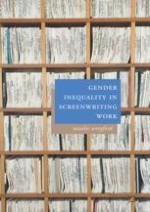2018 | OriginalPaper | Chapter
8. Conclusion: Moving Beyond Numbers to Make Change Happen
Author : Natalie Wreyford
Published in: Gender Inequality in Screenwriting Work
Publisher: Springer International Publishing
Activate our intelligent search to find suitable subject content or patents.
Select sections of text to find matching patents with Artificial Intelligence. powered by
Select sections of text to find additional relevant content using AI-assisted search. powered by
